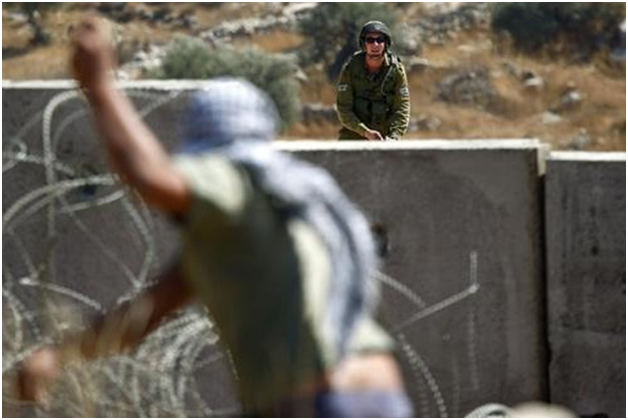Abbas Wants Israel to Determine Borders
How has Israel determined these borders?
NEW DELHI: Palestinian Authority President Mahmoud Abbas, speaking during a televised interview, demanded Israel determine its borders.
As quoted by Ma’an News, the PA leader said, "We will not go into a discussion about area A, B, and C. We need each state to finally determine their borders. Israel is the only state in the world with no known borders.”
"We are willing to wait a day, a week or a month," Abbas said, "but not 20 more years. "If they agree, we will be free with our borders. We will not accept that Israel launches a war against us every two years," Abbas said.
"We will not forgive and Israel will not get away with its crimes. We have a lot of ways and tools to ensure that criminals don't get away with their crimes," the leader concluded, referring to perhaps internal pressure that is demanding that Palestine join the International Criminal Court, a move that Abbas has resisted knowing that it will alienate the United States.
Abbas, whose Fatah signed a unity deal with Hamas, lambasted the latter for maintaining what he called a “shadow government” in Gaza. "Hamas has a shadow government in Gaza, they have undersecretaries for ministries, and if that continues it will put the national unity at risk," Abbas said.
The unity deal was the reason cited by Israel to pull out of US-brokered peace efforts as it considers the Hamas a terrorist organisation. The unity deal is also a factor according to many analysts for the recent 50 day assault on Gaza, which concluded this week with an indefinite ceasefire signed between Israeli and Palestinian representatives in Cairo.
The Palestinians, comprising of Hamas, Islamic Jihad and the Palestinian Authority, and the Israelis, signed the ceasefire, which came into effect at 7 PM local time on Tuesday. As per the ceasefire, brokered by the Egyptian government, Israel will open crossings on its border to allow humanitarian aid and construction material to reach Gaza; the fishing zone will be extended to six miles off the coast of Gaza; and the Rafah crossing between Gaza and Egypt will be opened.
The more contentious issues -- over which the ceasefire broke down and negotiations faltered previously -- will be deferred to a later date. These include the Palestinian demands for an airport and seaport in Gaza, the release of Palestinian prisoners, and Israel’s demand regarding the disarmament of Hamas.
However, the more contentious issues remain, and as pointed by Abbas, the key issue -- Israel’s refusal to declare borders -- has in no way been addressed.
Whilst the peace talks had taken the “green line” as the starting point for negotiations, thereby considering Israeli incursions beyond the pre-1967 territorial lines to be illegal and an obstacle to peace, Israel refused to recognise the Palestinian position.
Although the Palestine unity deal was the final straw leading to Israel pulling out of the talks, they had hit various roadblocks on issues such as Israel’s demand that it be recognized as a “Jewish state,” which Abbas did not agree to; the release of Palestinian prisoners after Israel reneged on an agreement to free prisoners in exchange for Palestine halting a push for membership to UN bodies; attacks and increased Israeli construction in besieged Gaza strip and West Bank territory, which itself is connected to Israel’s refusal to recognise the “green line.”
The end of 50 days of violence that has left over 2200 Palestinians dead and over 10,000 injured has brought relief to Gaza, but the key issues that led to the escalation of hostilities very much remain.





